Dr. Stijn Thoolen is the ESA-sponsored medical doctor spending 12 months at Concordia research station in Antarctica. He facilitates a number of experiments on the effects of isolation, light deprivation, and extreme temperatures on the human body and mind. Find this blog post in the original Dutch below.
Concordia, October 4, 2020
Sunlight: about 14 hours per day
Windchill temperature: -85 °C
Mood: excited, but there is a pinch of nostalgia. Already…
It’s 1:00 AM. I am lying outside on the roof, together with Ines (glaciologist), Elisa (cook) and Andrea (vehicle mechanic). There is a full moon shining on us, and Mars is right next to it. I am not much of an astronomer, but its bright color stands out so clearly from all the other celestial objects that even I can recognize it instantly as the Red Planet. Looking to the southwest I see Jupiter and Saturn. Also pretty hard to miss. Usually that is where I find the Milky Way, but there is too much light now, even at this hour. An amber color brightens the horizon, beyond which I now realize again there are just so many miles of ice (something easily taken for granted here, but thinking back to that inbound flight to Concordia last year does the trick) separating us from the rest of the world. In front of it all, I look at the frosty metal bars, which always looked so surrealistic to me when I saw pictures of them back home. They have gone through winter as well…
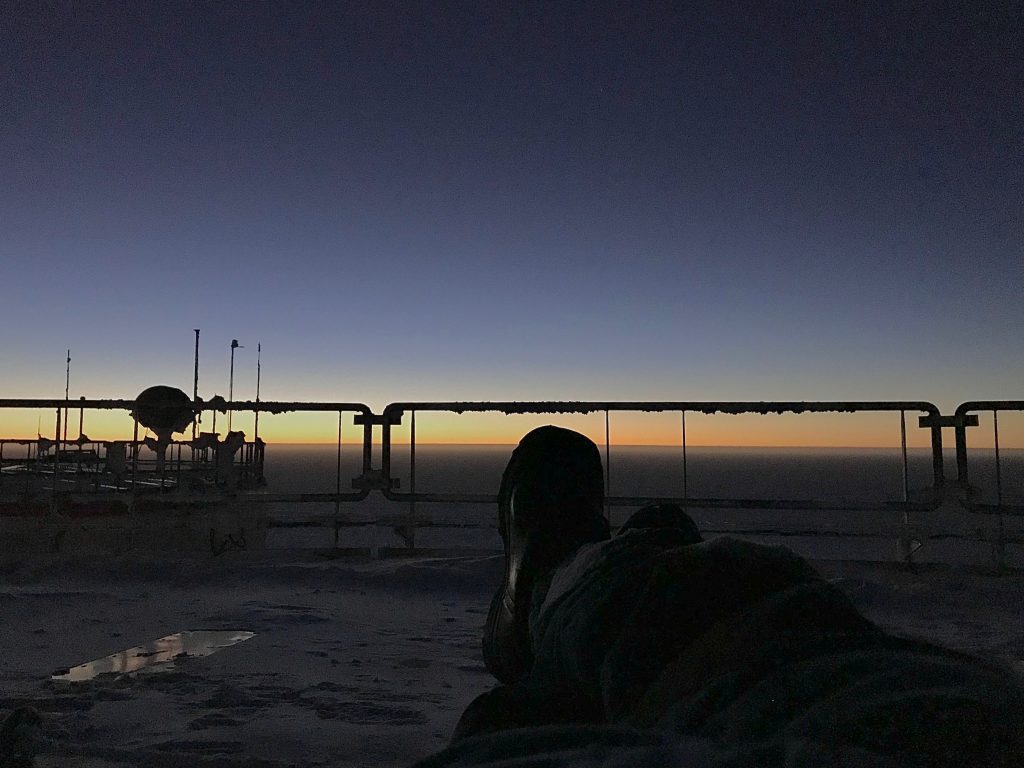
How will it be to go back home? With only one more month before the first plane arrives, I can’t help myself trying to picture how things will look when we return to ‘Earth’. And I have to admit: sometimes I look forward to a change. Not-so-constructive or even aggressive discussions, distance-creating demotivating remarks from others, and at times a lack of respect, understanding and team spirit: it is obvious that the winter has left its marks in our crew. At those moments I just wish to be among the people that are close to me again. My girlfriend, my family, my friends, who all seem to understand me down to a much deeper level. In a way the approaching summer is exciting.
The return of the sun was cool. ‘Here comes the sun’ (you know, that one from the Beatles) was heard all over the station while we impatiently and excitedly tried to catch a first glimpse of it mid-August. Since that moment the skies have become more and more blue, and the snow more and more bright. I have experienced the gradual return of daylight over the past weeks with a positive and fresh feeling, and a sense of anticipation has started to take hold of the station. Who are the people who will replace us? What are our plans after Concordia? I remember myself some weeks ago, lying in exactly the same position as I am right now, outside against a snow dune, sheltered from the wind and with a pleasant -50 degrees Celsius (I realize this perception must be taken relatively…), alone, and just letting the sunshine touch my face again. A special moment, that reminded me of how pleasant summer conditions are going to be.
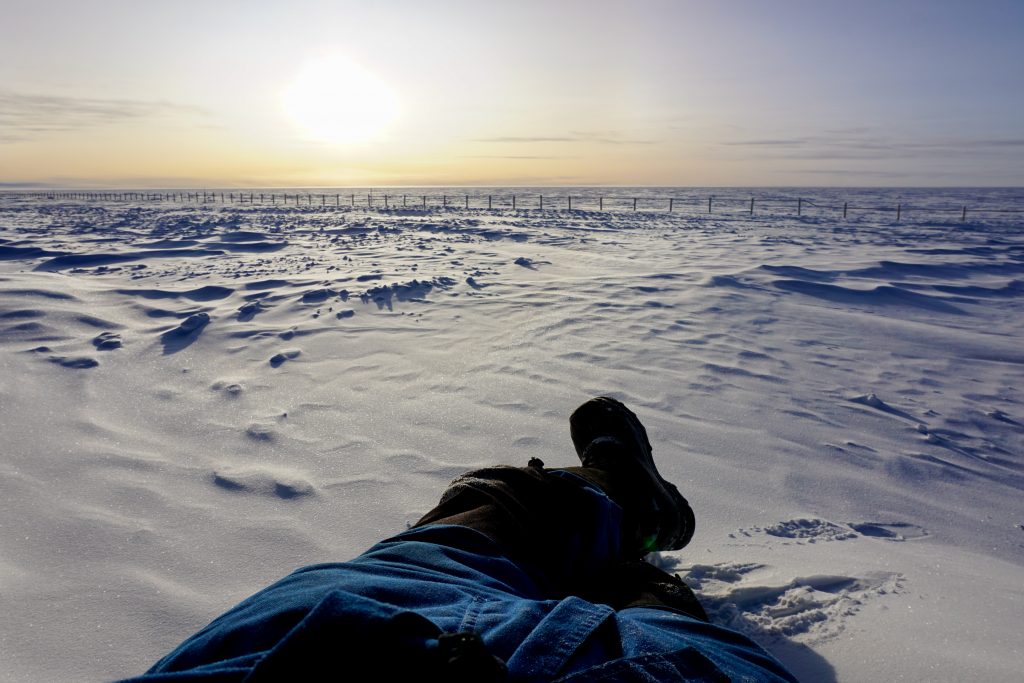
But funny enough now, here on that roof, I actually recognize myself trying to enjoy the last bits of darkness instead. Winter is over, and the light at the horizon is making sure I realize it. It makes me think of those unbelievable starry skies that I will probably never see again. Clear, twinkling, full of ‘falling stars’, here and there a satellite passing by, and dominated by the humbling Milky Way and it’s two neighboring Magellanic Clouds, which are actually other galaxies we gazed at with our naked eye! Being outside at night has been an impressive experience, every time again. I remember the pictures I tried to make some time ago, outside on my slippers, with pain in my toes and barely feeling my hands, but all overruled by the excitement to capture all those incredible stars and some vague aurora dancing around it. I am probably going to miss the night sooner than I sometimes like to think…
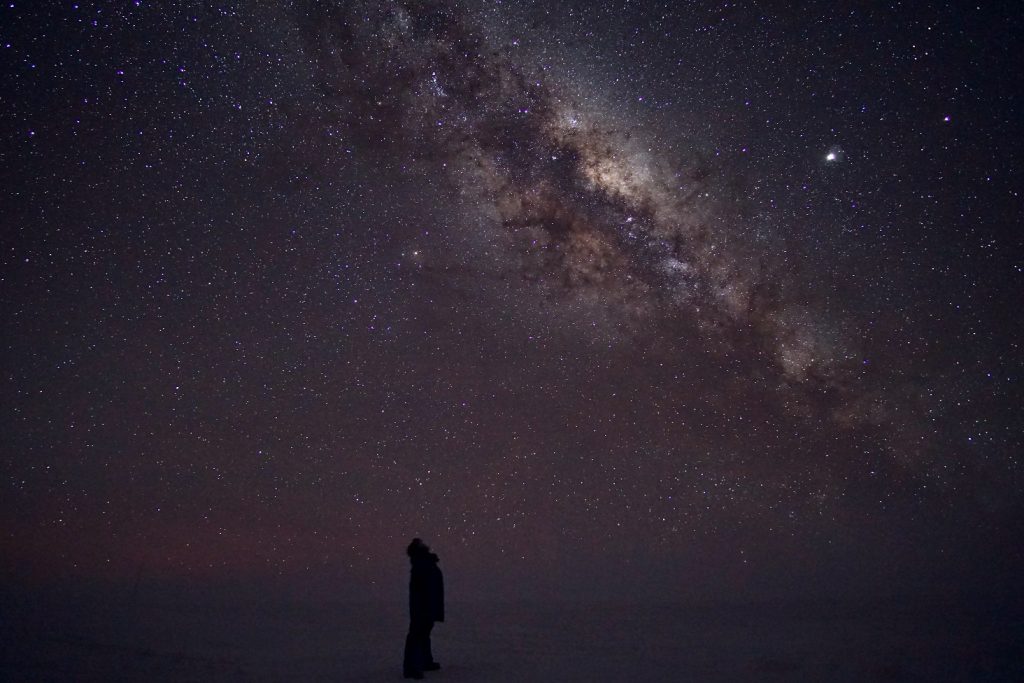
As a crew we have made wonderful memories as well. This evening for example I think we all felt that. We organized an ESA quiz some hours ago, revealing some particular results from the human research we have been doing here (‘Who lost the most weight?’, ‘How much DC16-poop will be sent back to Europe?’, ‘What is the most recurring motive on food pictures: pasta, pies, or middle fingers?’, you get the idea…), and reminding ourselves of some good moments we had this past year. Not just happy birthdays or rather inspiring Saturday night dance moves on ridiculous music in the living room disco, but much more sharing an extraordinary experience that only a handful of people will ever be able to grasp in its entirety, and perhaps most of all (and probably as a result of the latter) an endless amount of inside jokes. So different in nature, but unified through our experience.
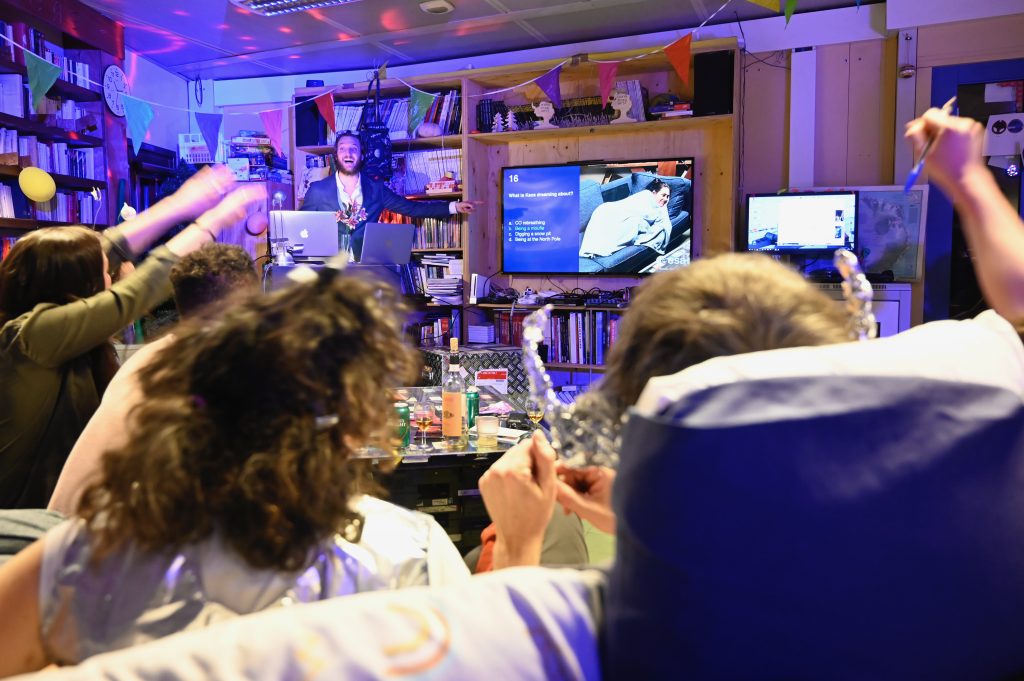
Lying here, thinking about all these special moments and happy memories, I feel inspired and incredibly lucky to witness all this. An incredible place to teach us about the world we live in, and a beautiful moment of realization to which I decide to hold on as much as I can under the rising pressure of the upcoming summer. I wish I could share it with the people at home…
How will it be to go back home? Maybe not that easy after all. The experiences we undergo here are intense, and it may actually be a challenge to make others at home understand what we have gone through, and make them feel the way we have felt. I will miss the night. I will miss our shared experiences. Left alone with those strong memories once we reintegrate into our old lives, Concordia may be hard to let go of. Perhaps Concordia now may become the place where we feel better understood, and I guess it is for this reason that many eventually make the decision to go back. Our Italian station leader appropriately calls it ‘mal d’Antartide’. Having been here four times now, he understands as no other this strong feeling of nostalgia for Antarctica.
When we go back home we will find ourselves in the richness and beauty of our old lives on one hand, but always carrying Concordia in the other. Torn apart between two worlds, each with its own treasures, and the combination of which is only understood by you…
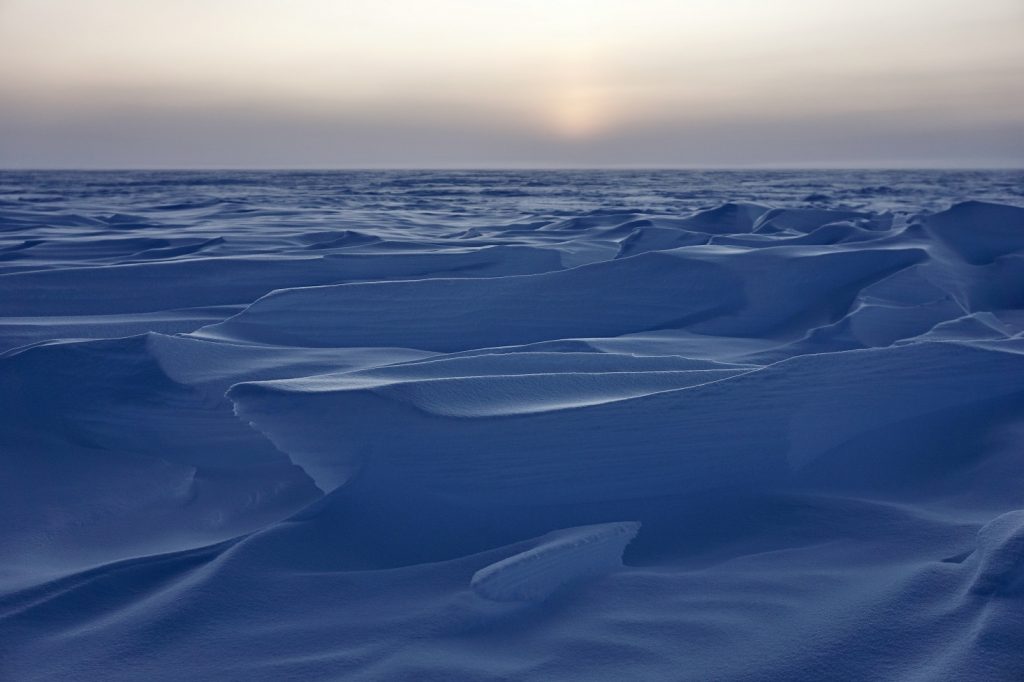
Twee werelden
Concordia, 4 oktober 2020
Zonlicht: zo’n 14 uur per dag
Gevoelstemperatuur: -85°C
Gemoedstoestand: enthousiast, maar met een vleugje nostalgie. Nu al…
Het is één uur ’s nachts. Ik lig buiten op het dak, samen met Ines (glacioloog), Elisa (kok) en Andrea (monteur). Boven ons schijnt een volle maan, en Mars staat er niet ver vandaan. Ik ben nou niet bepaald een astronoom, maar met een kleur zo helder ten opzichte van alle andere hemellichamen kan zelfs ik het direct herkennen als de rode planeet. Als ik naar het zuidwesten kijk zie ik Jupiter en Saturnus. Ook vrij moeilijk te missen. Hier vind ik normaal gesproken de Melkweg, maar er is te veel licht nu, zelfs op dit tijdstip. Een oranje-gele kleur verlicht de horizon, en ik denk nog eens aan al die kilometers ijs (iets wat je gemakkelijk voor lief neemt hier, maar even terugdenken aan die vlucht naar Concordia vorig jaar helpt wel), die ons isoleren van de rest van de wereld. Op de voorgrond de metalen stangen van het station, compleet bedekt met ijs, iets wat op foto’s altijd zo onwerkelijk leek toen ik nog thuis was. Ook die zijn de winter doorgekomen…
Hoe zal het zijn om weer naar huis te gaan? Met nog maar één maand te gaan voordat het eerste vliegtuig hier landt, kan ik het niet laten om mezelf in te beelden hoe het zal zijn om weer terug te keren ‘op aarde’. En ik moet toegeven: soms kijk ik wel uit naar wat verandering. De af en toe weinig constructieve of zelfs agressieve discussies, de afstand-creërende demotiverende opmerkingen van anderen, en het gebrek soms aan respect, begrip en teamspirit: het is duidelijk dat de winter zijn sporen heeft achtergelaten in onze bemanning. Op dat soort momenten zou ik het liefst weer bij mijn vriendin, familie en vrienden thuis zijn, die me allemaal een stuk beter lijken te begrijpen, en met wie ik meer op één lijn zit. Op een zekere manier is de naderende zomer een goed vooruitzicht.
De terugkomst van de zon was mooi. ‘Here comes the sun’ (je weet wel, die van de Beatles) was door het hele station te horen half augustus, terwijl we ongeduldig en vol enthousiasme probeerden die eerste zonnestralen op te vangen. Sindsdien is de lucht alsmaar blauwer geworden, en de sneeuw steeds helderder. Het langzaam terugkerende daglicht gaf me de afgelopen weken een positief, fris gevoel, en in het station heerst nu een stemming van anticipatie. Wie zijn de mensen die ons gaan vervangen? Wat zijn onze plannen na Concordia? Ik zie mezelf nog liggen enkele weken geleden, in exact dezelfde positie als nu, buiten tegen een sneeuwduin, uit de wind en met een plezierige -50 graden Celsius (dit moet je misschien in perspectief zien…), alleen, terwijl ik simpelweg geniet van de zon in mijn gezicht. Een bijzonder moment, dat me er nog eens aan herinnerde hoe aangenaam de zomer zal zijn.
Maar nu grappig genoeg, hier op dat dak, merk ik eigenlijk dat ik nog zo veel mogelijk wil genieten van de laatste duisternis. De winter is voorbij, en het licht aan de horizon maakt me dat vannacht duidelijk. Ik denk aan die ongelooflijke sterrenhemel die ik waarschijnlijk nooit meer zal zien. Helder, glinsterend, vol ‘vallende sterren’, hier en daar een satelliet die voorbij zweeft, en bovenal die overheersende en klein makende Melkweg met zijn twee naburige Magelhaense wolken (andere sterrenstelsels die we met het blote oog konden zien!). De nachten buiten waren overweldigend, iedere keer opnieuw. Ik herinner me de foto’s die ik een tijdje terug probeerde te maken. Buiten op mijn sloffen met pijn in mijn tenen en amper gevoel in mijn vingers, en te veel enthousiasme om me daar druk over te maken, om al die fantastische sterren en een wat vage, eromheen dansende aurora vast te leggen. Ik ga de nacht waarschijnlijk eerder missen dan ik soms wil geloven…
Maar ook als bemanning hebben we prachtige herinneringen. Ik denk bijvoorbeeld dat we dat deze avond allemaal wel gevoeld hebben. Een paar uur terug hadden we een ESA-quiz georganiseerd, waarin enkele eigenaardige resultaten van het biomedisch onderzoek werden onthuld (‘Wie heeft de meeste kilo’s verloren?’, ‘Hoeveel DC16-poep wordt er terug naar Europa gestuurd?’, ‘Wat is het meest terugkerende thema op de foto’s die ik maak van ons eten: pasta, taart, of middelvingers?’, je snapt het wel…), en waarbij we de goede momenten van het afgelopen jaar nog eens konden herdenken. Niet alleen de fijne verjaardagen of inspirerende zaterdagavond-danspasjes op belachelijke muziek in de woonkamer-disco, maar ook zeker het delen van een buitengewone ervaring die maar door een handjevol mensen ooit in zijn volledigheid zal worden begrepen, en misschien nog het meest (en waarschijnlijk als gevolg van het laatste) een eindeloze hoeveelheid inside jokes. Zo verschillend van aard, maar door onze ervaring verbonden.
Nu ik hier lig, denkend aan die speciale momenten en mooie herinneringen, voel ik me geïnspireerd en intens gelukkig dat ik dit allemaal mee maak. Een geweldige plek om ons te leren over de wereld waarin we leven en een prachtig moment van realisatie, waaraan ik besluit zoveel mogelijk vast te houden onder de toenemende druk van de aankomende zomer. Kon ik het maar delen met de mensen thuis…
Hoe zal het zijn om weer naar huis te gaan? Misschien toch nog zo gemakkelijk niet. De ervaringen die we hier ondergaan zijn intens, en het zou nog wel eens een uitdaging kunnen zijn om anderen thuis te laten begrijpen wat wij hebben meegemaakt, en te laten voelen wat wij hebben gevoeld. Ik zal de nacht wel missen. En onze gedeelde ervaringen. Concordia is vast niet gemakkelijk los te laten als we eenmaal terug in onze oude levens stappen, als we alleen achterblijven met al die krachtige herinneringen. Misschien wordt Concordia dan wel de plek waar we ons beter begrepen voelen, en ik kan me voorstellen dat dit voor velen de reden is om uiteindelijk terug te keren. Onze Italiaanse stationsleider noemt het toepasselijk ‘mal d’Antartide’. Inmiddels voor de vierde keer hier, begrijpt hij als geen ander deze sterke nostalgie voor Antarctica.
Als we naar huis gaan komen we weer terecht in de rijkdom en schoonheid van onze oude levens, maar we zullen nu altijd Concordia bij ons dragen. Heen en weer geslingerd tussen twee werelden, elk met zijn eigen kostbaarheden, en waarvan alleen jij het samenspel begrijpt…



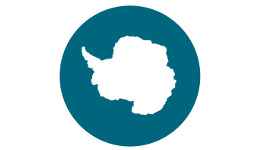
Discussion: one comment
Watching the galaxy is always mesmerizing …. But it must be so different when you do it in the Antarctica, a land so vast inhabited by so few.